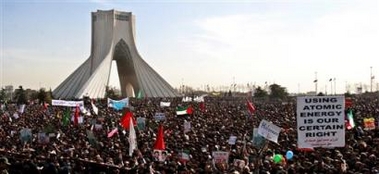|
Iran postpones uranium talks with Russia
(AP)
Updated: 2006-02-13 19:18
Iran has called off this week's talks with Moscow on a
plan to allay concerns about Tehran's use of nuclear fuel by enriching Iran's
uranium in Russia, the president's spokesman said Monday.

Tens of thousands of Iranians listen to the
speech of Iranian President Mahmoud Ahmadinejad, unseen, in a ceremony
marking the 27th anniversary of Iran's Islamic Revolution at the Azadi
(Freedom) Sq. in Tehran, Iran, Saturday, Feb. 11, 2006. The Iranian
president on Saturday rejected Western pressure to freeze the country's
nuclear program and issued a veiled threat to walk away from the Nuclear
Nonproliferation Treaty. The Azadi (Freedom) tower is seen at left.
[AP] |
The talks were to have resumed Thursday but have been postponed indefinitely
because of the "new situation," spokesman Gholamhossein Elham said, referring to
the U.N. nuclear agency's decision earlier this month to report Iran to the U.N.
Security Council.
Iran strongly protested the referral, which was supported by Russia, usually
one of Tehran's allies.
Elham said the talks will reconvene at a time of "mutual agreement."
Russia's Foreign Ministry said Monday that Foreign Minister Sergey Lavrov
would discuss Tehran's nuclear program with European Union leaders in Vienna
this week. It did not mention Elham's announcement.
Elham also reiterated President Mahmoud Ahmadinejad's statement Saturday that
Iran will "revise" its policy toward the International Atomic Energy Agency
regulations and the Nuclear Nonproliferation Treaty if they are used against the
country.
Elham said the world must recognize Iran's rights as a signatory to the
treaty and regulations. "Otherwise there is no reason to continue our current
nuclear policy while we are deprived of the positive aspects of the treaty."
Moscow had proposed that Iran ship its uranium to Russia, where it would be
enriched to a level suitable for nuclear reactors. It would then be returned to
Iran to be used in its Russian-built reactor at Bushehr. The reactor is due to
start up later this year.
The plan, backed by the United States and European Union, was an attempt to
avoid international objections to Iran's enriching uranium — a process that can
also produce material for nuclear weapons. Iran had said the plan did not
fulfill its requirements but was worth pursuing further in negotiations.
The United States accuses Iran of seeking to build a nuclear bomb under cover
of a peaceful nuclear program. Iran insists its program is confined to the
generation of electricity.
After the IAEA voted on Feb. 4 to report Iran to the Security Council, it
ended voluntary cooperation with the agency and announced it would start
large-scale uranium enrichment and bar surprise inspections of its facilities.
It has yet to say whether uranium enrichment has begun.
The IAEA is due to issue a report on Iran at its March meeting, after which
the Security Council is expected to consider taking steps against the country,
which could include sanctions.
Elham said Monday that Iran was not delaying the resumption of uranium
enrichment until after the IAEA meeting, but he did not elaborate.
He repeated Iran's line that if the Security Council imposes sanctions on
Iran, they will backfire.
"If some Western countries, provoked by Israel, intend to put pressure on
Iran, then they will also lose. We do advise the United States and Europe to
decide in a rational and prudent way," he said.
|